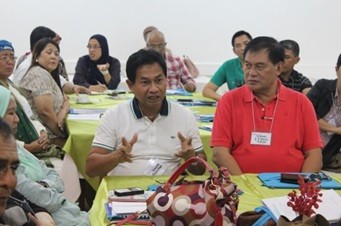
July 2014—Bayanihan, or the spirit of helping one’s neighbor, binds local officials in the Philippines’ Autonomous Region in Muslim Mindanao, thanks to recent workshops for local school boards.
“They should progress the way we progressed," says Mayor Ibrahim Ibay of the municipality of Parang, Maguindanao, referring to neighboring rural towns. He hopes that his town’s progress will create a domino effect to benefit everyone. “If they are not economically stable, we are also affected.”
Ibay believes that education is the key to solving poverty and that his involvement with USAID’s Education Governance Effectiveness (EdGE) project has helped him to help his town. He expects the educational reform, now being implemented in Parang, will also reach adjacent towns.
Through a series of workshops for parents, teachers and local leaders in 2013, the people of Parang learned to work together to oversee the studies of their children. Even with little financial resource, strong community support led to an increase in performance in the National Achievement Test from 53 percent in 2012 to 61 percent in 2013.
The sentiment is similarly expressed by Mayor Shajid Khan Pendatun of the municipality of Gen. SK Pendatun, Maguindanao. He and other seasoned members under the USAID project have invited other local government leaders to see for themselves how local school board workshops can improve children’s education within their territories.
Pendatun acknowledged the need to learn from others: “Just because you are a mayor doesn’t mean you know everything. No. No. No.” With the help of his district supervisor, he commits to do everything he can for the betterment of education.
“No man is an island,” says Mayor Nashiba Sumagayan of the municipality of Taraka, Lanao Del Sur. While her administration gives top priority to education, she believes it cannot realize its vision alone. She attests that EdGE has been a big help. “We can now bring out the issues and problems confronting us about education.”
Mayor Husin Amin of Jolo, Sulu, says that strengthening the local school board, as advocated by EdGE, improved education more than previous efforts. Funds, he says, are monitored and distributed equally. His school board now includes a budget and planning officer, assessor and a representative from the food sector.
The aggressive effort to involve community leaders is just one of the benefits that USAID’s EdGE project has delivered to help reinvent local school boards, improve education, and provide better opportunities for the country’s future generation.
The five-year EdGE project, which runs from 2013 to 2018, seeks to improve education governance through decentralization, with the end goal of improving learning outcomes, particularly early grade reading, for at least 1 million children.
LINKS
Follow @USAID_Manila, on Facebook, on Flickr, on YouTube







Comment
Make a general inquiry or suggest an improvement.